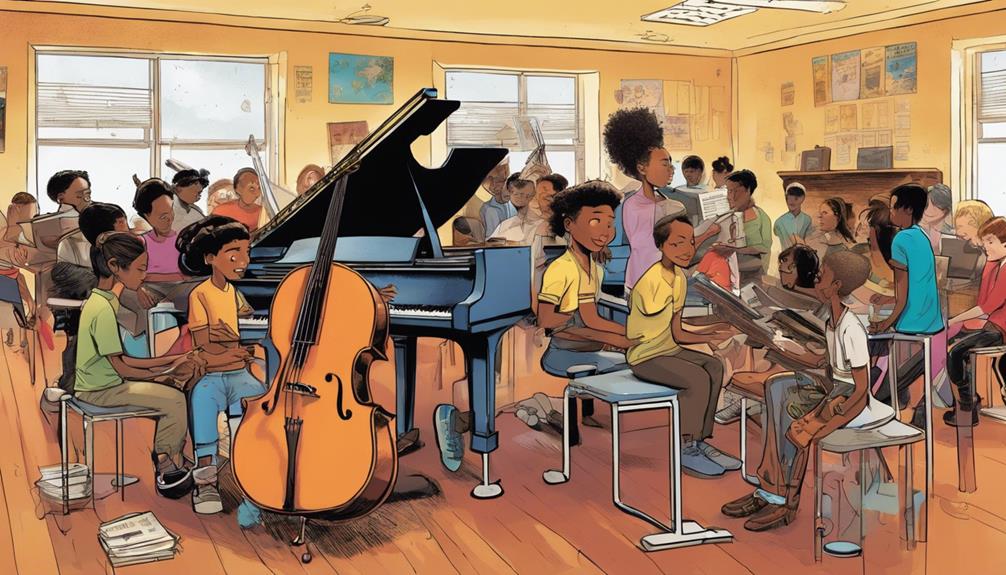To succeed at music school, you'll need to develop a structured approach to learning. Start by preparing for practice sessions, creating a conducive environment, and setting specific goals. Break down challenging passages into smaller sections and practice with a metronome to master them. Record yourself to reflect on your performance, identifying areas for improvement. Establish a regular practice routine, including warm-up exercises and experimentation with techniques. Stay motivated by attending concerts, collaborating with peers, and seeking mentorship. By following these tips, you'll be well on your way to realizing your full potential – and there's more to discover to help you get there.
Key Takeaways
- Create a conducive learning environment with a structured approach and necessary tools to stay focused and motivated.
- Break down challenging passages into smaller sections and practice with a metronome to master them efficiently.
- Record and reflect on your performances to identify areas of improvement and track progress over time.
- Establish a regular practice routine with warm-up exercises and experimentation with different techniques to cultivate discipline and consistency.
- Stay motivated and inspired by attending concerts, collaborating with peers, and seeking mentorship from professionals to keep learning exciting.
Prepare for Practice Sessions
To get the most out of your music school experience, it's essential to prepare for practice sessions by creating a conducive learning environment and establishing a structured approach. This begins with creating a designated practice space that's equipped with all the necessary tools and resources. Having everything you need in one place will help you stay focused and avoid distractions.
Next, set specific goals for each practice session to make sure you're using your time effectively. This will help you measure progress and stay motivated. It's also important to establish a consistent practice schedule that aligns with your peak concentration times, maximizing your productivity.
Master Challenging Passages

Mastering challenging passages requires a strategic approach, as breaking them down into smaller, manageable sections allows you to focus on perfecting each part before combining them seamlessly.
At music school, you'll encounter complex passages that demand attention to detail and deliberate practice. To tackle these, use a metronome to practice at a slower tempo, gradually increasing the speed as you become more comfortable.
Implementing different practice techniques, such as rhythmic variations or playing in different articulations, can also help you master challenging passages. Analyzing the musical structure and patterns within these passages will enhance your understanding and memorization.
If you're struggling, don't hesitate to seek guidance from your teachers or peers, who can offer valuable insights and strategies for mastering difficult passages. By incorporating these approaches into your practice routine, you'll be well on your way to conquering even the most formidable musical challenges.
With persistence and the right strategies, you'll be able to perform challenging passages with confidence and precision.
Record and Reflect Performance

You've worked tirelessly to master those challenging passages, and now it's time to capture your progress by recording yourself and reflecting on your performance. This important step allows you to engage in self-assessment, identifying areas of strength and weakness.
By reflecting on recordings, you'll gain valuable insights into your musical expression and technique. A good teacher will encourage you to record yourself regularly, as it's a common practice in music education.
Analyzing your recordings helps you pinpoint areas that need improvement, and with a clear understanding of what needs work, you can focus your practice sessions more effectively. Music teachers often use recordings to provide feedback, and by doing so yourself, you'll be able to identify areas that require more attention.
Establish a Practice Routine

By committing to a regular practice routine, you'll cultivate the discipline and consistency necessary to make meaningful progress in your music education. A well-structured practice routine helps you stay focused, motivated, and directed towards your musical goals.
Here are some essential tips to establish an effective practice routine:
- Allocate a specific time each day for practice to build consistency and discipline.
- Break down practice sessions into manageable chunks to focus on different skills or pieces.
- Include warm-up exercises to prepare physically and mentally before diving into practicing.
- Experiment with various practice techniques to find what works best for your learning style and musical goals.
Stay Motivated and Inspired

As you commit to your practice routine, it's equally important to stay motivated and inspired to avoid burnout and maintain a passion for learning. Staying motivated requires intentional effort, and there are several strategies to help you do so.
| Strategy | Description | Benefits |
|---|---|---|
| Attend concerts, recitals, and masterclasses | Expose yourself to high-level performances | Stay inspired, learn from others |
| Collaborate with peers | Work on music projects together | Foster creativity, motivation |
| Seek mentorship | Guidance from professors and professionals | Gain valuable insights, stay on track |
| Set personal goals | Define milestones and track progress | Maintain motivation, focus |
| Explore new genres | Discover new styles, techniques | Keep learning fresh, exciting |
Frequently Asked Questions
How to Be Successful in Music School?
To be successful in music school, you'll build relationships with peers and teachers, prioritize reliability and professionalism, and embrace challenges and diverse styles to grow artistically and personally.
What Makes a Good Music Student?
You're like a master chef, mixing discipline, dedication, and commitment to create a recipe for success. To be a good music student, you engage actively, seek feedback, and prioritize your musical education, staying motivated and professional.
How to Engage Students in Music Class?
To engage in music class, start by embracing interactive activities like musical games, leveraging technology, and collaborating with peers on projects and performances. To further enhance your experience, explore different instruments and experiment with various musical styles to broaden your skills and understanding. Pay attention to lessons that teach you how to play music at school, and don’t hesitate to ask for guidance from your teacher or classmates. By actively participating and expressing creativity, you’ll cultivate a deeper appreciation for music and build lasting connections with others.
How to Learn Music Effectively?
"Imagine devouring music like a starving artist, and suddenly, notes dance on the page, and your fingers conjure melodies You'll learn music effectively by setting clear goals, practicing regularly, and embracing diverse genres, fuelling your artistic growth!"
Conclusion
As you start on your musical journey, remember that learning is a lifelong process. Like Odysseus steering through the perilous seas, you'll encounter challenges, but with persistence and dedication, you'll reach your destination.
By incorporating these tips into your daily routine, you'll be well on your way to mastering your craft. Stay focused, stay motivated, and most importantly, stay true to your passion for music.










